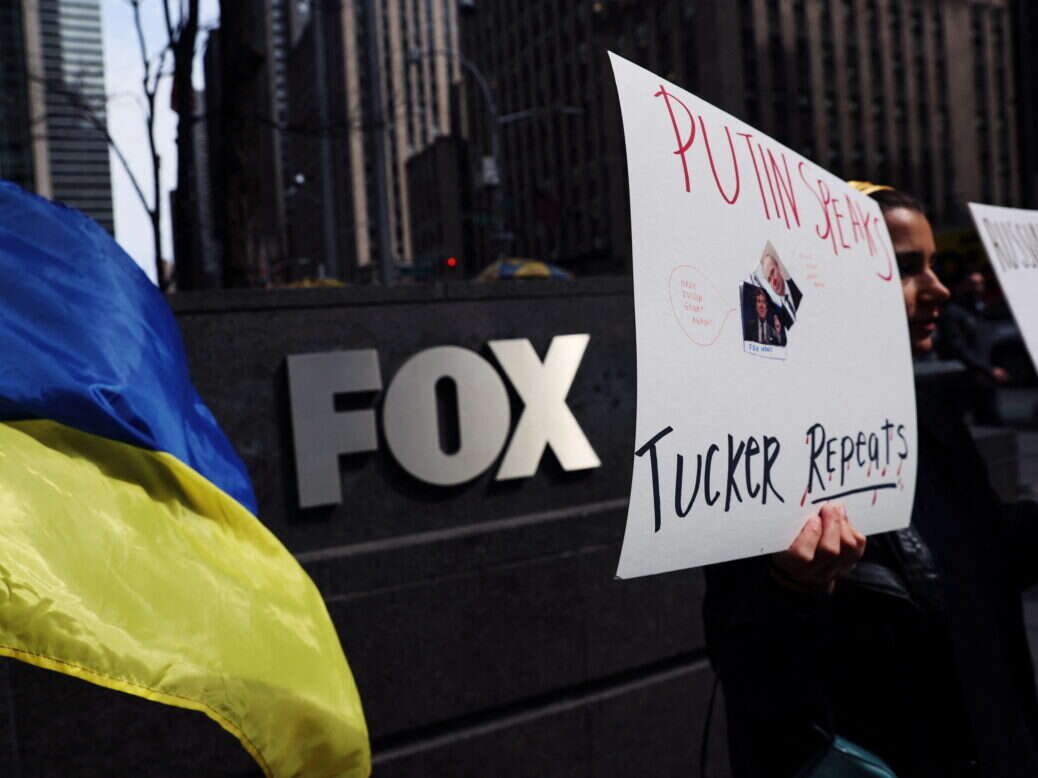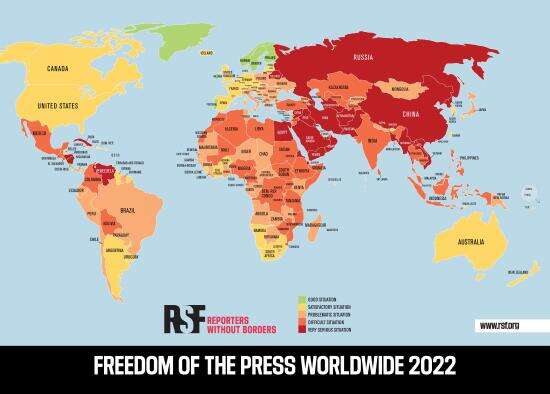
Reporters Without Borders (RSF) has warned that a combination of the “Fox News-isation” of media alongside online fake news and propaganda has had a “disastrous effect” around the world.
With the release of its World Press Freedom Index 2022, the campaign group blamed social media and opinion-centric media such as Fox for stoking “news and information chaos” and contributing to a jump in societal polarisation.
Giving examples, and noting the countries’ places in the World Press Freedom Index 2022, RSF said: “Media polarisation is feeding and reinforcing internal social divisions in democratic societies such as the United States (42nd), despite President Joe Biden’s election.” The US rose two places from 44th in 2021.
“The increase in social and political tension is being fuelled by social media and new opinion media, especially in France (26th),” RSF continued.
“The suppression of independent media is contributing to a sharp polarisation in ‘illiberal democracies’ such as Poland (66th), where the authorities have consolidated their control over public broadcasting and their strategy of ‘re-Polonising’ the privately owned media.”
The annual RSF World Press Freedom Index has used a different methodology this year, employing a combination of a quantitative survey of press freedom violations and abuses and a qualitative study based on a questionnaire answered by hundreds of experts. The questionnaire has been updated to better reflect challenges posed by the changing media environment, including digitalisation.
Because of the change in methodology, care should be taken when comparing the 2021 and 2022 figures (although we have done so here to give some context).
Under the new methodology, the UK is ranked 24th out of 180 countries (in 2021 it was 33rd and in 2020 it was 35th). This is deemed "satisfactory".
Some of the biggest concerns raised around the UK's press freedom situation include the ongoing process to extradite Wikileaks founder Julian Assange, heightened threats to journalists in Northern Ireland, and Freedom of Information failures.
RSF also cited "worrisome" legislative proposals such as the plan to treat journalists like spies under reform of the Official Secrets Act, a lack of plurality in the national newspaper market, government inference in the appointment of Ofcom chair that saw ex-Daily Mail editor Paul Dacre put forward as the favoured candidate, and the ongoing threat of "SLAPP" cases intimidating journalists - although reform of these laws has now been proposed.
The UK has also seen an increase in the amount of opinion-led news broadcast programming with the launch of GB News last year and Rupert Murdoch's TalkTV last week, which although it features an impartial news programme also has monologues from Piers Morgan and panel discussions led by Sharon Osbourne and Jeremy Kyle.
Press Gazette editor-in-chief Dominic Ponsford wrote of TalkTV's audience: "Like Fox News in the US, and GB News in the UK, they may be looking for a channel that reinforces their beliefs rather than challenges them."
Only eight countries have a "good" rating in the 2022 ranking: Norway, Denmark, Sweden, Estonia, Finland, Ireland, Portugal and Costa Rica.
Some 27 countries are in the worst, "very serious" category including Belarus, Russia, Afghanistan, Pakistan, Saudi Arabia, Iraq and China.

World Press Freedom Index 2022 map
RSF secretary-general Christophe Deloire said: “Margarita Simonyan, the editor in chief of RT, revealed what she really thinks in a Russia One TV broadcast when she said ‘no great nation can exist without control
over information’.
"The creation of media weaponry in authoritarian countries eliminates their citizens’ right to information but is also linked to the rise in international tension, which can lead to the worst kind of wars.
"Domestically, the ‘Fox News-isation’ of the media poses a fatal danger for democracies because it undermines the basis of civil harmony and tolerant public debate."
Deloire chairs the Forum on Information and Democracy and suggested its New Deal for Journalism, proposed last year, could be a solution to these issues. Key recommendations within the proposal include governmental support for independent professional journalism and news media, indirect support such as tax breaks, regulatory oversight of online content moderation, the honouring of human rights commitments, and more.
RSF noted that before Russia's (155th place) invasion of Ukraine (106th), there had been a "propaganda war" led by the Kremlin, showing how media-induced polarisation can have drastic effects.
The impact of arrests of journalists and the forced closure of several pro-democracy news outlets has been seen in Hong Kong, which has plummeted from 80th to 148th in the World Press Freedom Index 2022.
Picture: Reuters/Shannon Stapleton
Email pged@pressgazette.co.uk to point out mistakes, provide story tips or send in a letter for publication on our "Letters Page" blog
